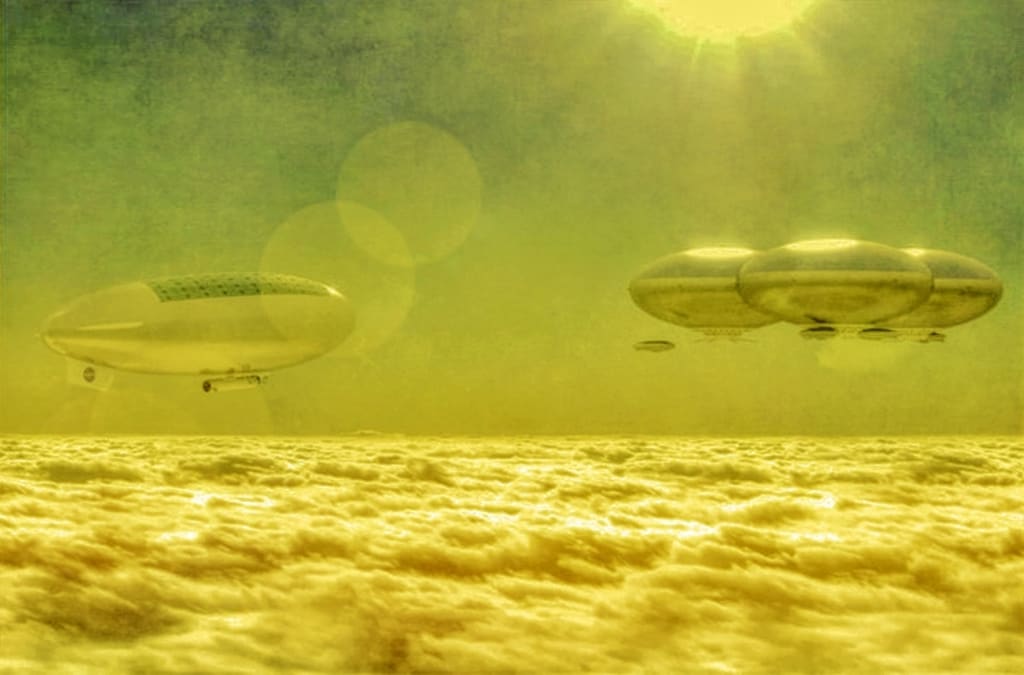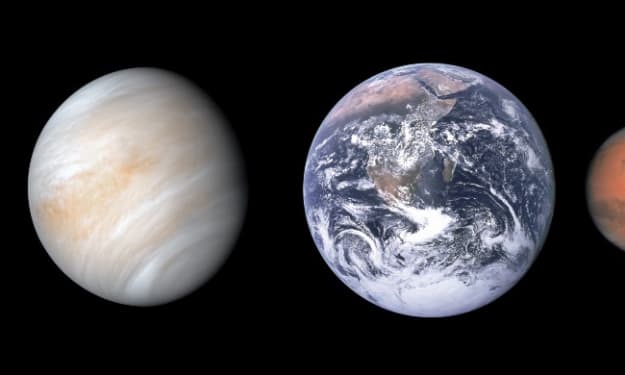

“Nobody can hear a scream in the vacuum of space, or so they say.”
Ahmad was shaken from his stupor of staring out at the yellow dot growing minutely larger in the distance. Turning to his right, Ahmad peered at the man floating next to him who had just spoken. Blinking to regain his focus, he blurted out, “Excuse me, what?” not sure he had heard the other man’s words correctly.
To his surprise, Ahmad found he did not recognize the fellow at all. Under his bright, single-colored dashiki and matching pants combination, all Ahmad could tell was that he was dark skinned, clean-shaven, and amazingly—despite several months of drifting in microgravity—solidly muscular. Not that Ahmad ever had a musculature to speak of to lose; he had always been a rounder person, no matter what lifestyle he had led. It did not help that even for someone from the unnamed sand dunes on the outskirts of the United Arab Emirates, Ahmad was quite short. Although, without the constant downward pressure of gravity Ahmad had gained a couple of centimeters. The stranger did not appear much taller than even Ahmad’s mildly exaggerated height. Putting this all together with his accent, Ahmad deduced that the unknown man might be Nigerian.
“Oh, pardon me,” the seemingly younger man said in a clipped, but perfectly practiced English, “I did not realize I had spoken out loud. Ah, I do not believe we have met! Many apologies, my friend, please allow me to introduce myself. I am Durojaiye Yakubu.”
Yes, I was spot-on, Ahmad thought, with a name like that, definitely Nigerian.
Durojaiye held out an open hand with an offer of a handshake in the western style. Ahmad hesitated for a moment, concerned about what type of microbes could be growing on his unfamiliar guest after they had all been so long confined to the ship. However, he decided it would be ill-mannered of him to not to accept the invitation and took the man’s hand firmly in his own. Much to Ahmad’s horror, Durojaiye released his hold on the straps attached to the full-length windows in front of them. They had been given strict safety instructions to never let go of the clutch-devices lest they go flying out of control and break something or someone. Gripping on to his own strap for both of their dear lives, Ahmad solidly held Durojaiye’s palm so he would not sail away from the momentum of their greeting.
Still holding on tight, Ahmad said in trained politeness, “A pleasure to make your acquaintance, Mr. Yakubu, I am Ahmad Al Zaheri. It is odd that although there are only a few thousand people on this transport, I do not believe I have ever seen you before.”
“Please, call me Durojaiye,” Mr. Yakubu responded before finally pulling his hand away to free-float. “Well, it may be because I generally keep my own time.”
Ahmad thought about that for a moment. On Earth, everyone in different geographic regions had a clock that aligned the hours with what was the most reasonable for their area. Of course, this had been greatly complicated by the advent of colonizing other worlds. On Earth’s moon Luna, for instance, it was daytime for about two weeks and then nighttime for around the same. Meanwhile, on Mars, a sol was roughly 39 and a half minutes longer than a typical Earth-day. That bit of extra time did not seem like much, but it quickly became evident that throwing off natural circadian rhythm even a small amount created many adverse health effects. In the end, because people living on Luna, Mars, or the rotating asteroids had to live underground anyway in order to avoid the deleterious effects of solar radiation, they all ended up going back to 24-hour based clocks anyway and picked a timezone comparable to one back on Earth. Usually this was the area that most of people came from—or, more likely, the one that the monetary sponsors originated from despite the fact that the generally poorer laborers outnumbered them 20-to-1.
The ship Ahmad and Durojaiye were on was a dedicated ferry, going back and forth from Tsiolkovsky-Pearson Station at the end of the space elevator above Volcán Cayambe in Ecuador to a receiving base in orbit around Venus. Their final destination from there was Aestas, the first of the soaring sky-cities above Venus’ hellish surface. Named after the Roman goddess that is the personification of Summer, Aestas was basically a dirigible filled with an Earth-like atmosphere that allowed it to stay aloft in Venus’ much denser “air”. To the surprise of many Earthlings, Mars continued to prove highly resistant to every terraforming effort, so an early 21st century NASA proposal called “Project HAVOK” was revived with the idea of putting floating habitats on Venus.
While the pressure on the surface of Venus was almost a hundred times that of Earth and the temperature could reach a blistering 465°C—hot enough to melt lead—that was not true higher up above the clouds. There, the pressure was more tolerable and it was far cooler. Although still too hot to handle, it was well within the range of even 21st century refrigeration technology to cool the interior on an object residing at that level in the stratosphere. Further, Venus had an induced magnetic field to protect it from the solar radiation that kept the denizens of Luna and Mars from seeing the sun for but a few short hours a month. And most of all, the gravity was 90% that of Earth, a difference that was barely noticeable. Gravity and magnetic fields had been found to be the key factors in keeping Earth-beings alive, and thus it was a constant struggle in places that lacked them.
This was not the case with Aestas, a metropolis that now thrived with hundreds of thousands of people. The city actually propelled itself across the terminus line where the sun met the darkness, creating a 24-hour-ish “normal” cycle. The people lived on its solid platforms, grew food and trees under a visually-larger sun, and had a perpetual summertime thanks to the city’s movements and the general conditions of Venus. Compared to almost all other planets, Venus spun in the opposite direction—retrograde, albeit very slowly, with a sol on Venus lasting even longer than its full rotation around the sun—perhaps because some other large terrestrial object slammed into it in the distant past. And unlike Earth’s and Mars’ highly angled axial tilts and elliptical orbits, Venus stood nearly straight-up as it circumnavigated the sun in an almost perfect circle. All these factors made it so Aestas’ environmental and navigation systems could more easily create and maintain a true Eden.
Their ferry kept the same time as Aestas, so it made sense to match up to it in the long three-and-half month journey between worlds. To find someone who was keeping their own time was quite unusual, to say the least, especially at this point in the voyage.
“That is a surprise to hear,” Ahmad frowned. “May I ask why you are doing so? After all, we will soon arrive at our new home.”
“Yes, well, I suppose I am just holding on to the last bit of my old motherland,” Durojaiye said without offering the name of his country of derivation, irking Ahmad at the lack of confirmation for his prior assumption. “When we arrive, I will have abundant time to make the full transition.”
This was true enough. After they disembarked at Aestas, they would have several months of physical therapy ahead of them to gain back the calcium leached from their bones and to learn how to walk again. These sessions could take anywhere from three to six months, sometimes even up to a year. During that time, they were not allowed outside and had to stay inside a complex that was not completely dissimilar from being confined within the ship. Not everyone was successful at these adaptations, either. In some semi-rare instances, a person was never able to fully acclimate to being on Venus for any variety of reasons, much like some people could not cope with living on top of a Tibetan mountain while for others it caused no discomfort. In these situations, the people often had to give themselves over to a type of indentured servitude aboard the interplanetary shuttles, attempting to make up the debt for the cost of their passage and eventual return to Earth. In reality, few ever escaped their involuntary labor, but it was a concern the governments chose to turn a blind eye towards.
Attempting to make conversation, Ahmad said, “And when we land, you can stop worrying about the vacuum of space. We will be very safe down there.”
“Yes, stuck inside the Yellow Balloon,” Durojaiye bemoaned.
Ahmad reflexively cringed, and it showed on his face before he could stop it. He hated the term “Yellow Balloon”. It was a derogatory phrase used by those on Earth and the other colonies who felt that Aestas was a complete waste of time and resources. Everywhere he had been, Ahmad had met many people who felt this way, including his own family. They were not supportive of his decision to immigrate to Venus, and made no qualms about letting him know. “Yellow Balloon” came up quite frequently in their criticisms of his decision.
Seeing Ahmad’s reaction, Durojaiye gasped and said, “I’m sorry, I’ve offended you. Please forgive me! It is just that sometimes I think about that without those protective barriers, we would be sublimated almost instantaneously. Or if the city fell in height just a little bit, the pressure would crush us all. And what if...”
As Durojaiye began to list more ways they could die in the hostile vastness of Venus and outer space in general, Ahmad’s watch started beeping. Taking a look at it, Ahmad said, “I beg your pardon, I have overstayed my time by the windows. My rad-count has already exceeded my daily allotment and I must return to my quarters.”
Most of the ship’s exterior walls were filled with machinery, water, and insulation; anything to slow down and hopefully stop the constant bombardment of cosmic rays—though it was well known the solution was hardly perfect. Only the meter-thick windows at the bow of the ship allowed a view of anything other than the interior bulkheads. It was a reluctant contrition the astronomers and physicists gave the shipbuilders and psychiatrists, with the compromise being that each passenger would wear a watch at all times that would measure their radiation exposure and absorption. It was then that Ahmad noticed Durojaiye had nothing on his wrists but braided ornaments.
“Durojaiye, where is your watch?” Ahmad exclaimed in sheer terror for the man. “How long have you been here? Please, come with me back to the quarters. Maybe we should take you to sickbay to have you checked out?”
“Do not worry about me,” Durojaiye calmly declared, “I’ll be fine. They are overprotective of us and give numbers that are far below what we can handle. I’ve done this many times; it is no problem. But if you wish to go, you may. Do not stay on my account.”
Having no intention of doing so, Ahmad implored Durojaiye one more time before wishing him peace and safety, leaving him alone. On the way back to his own quarters, slowly pulling himself along the attached rails, Ahmad wondered how a person could be both so fatalistic and reckless at the same time. He could not piece together the enigma that was Durojaiye Yakubu; the man would just not fit together.
Of course, many people would say the same about Ahmad Al Zaheri himself. As a small child, he became infatuated with watching a bright yellow spot making loop-the-loops on the low horizon. When it was the morning star, he would wake up early every day to see it. Conversely, when it was the evening star, he would drop everything, even abandoning a fútbol game with his friends to track it with his small, second-hand telescope. As he got older, his parents decided that he needed a better education than could be provided in the village near their homestead and sent him to a private school in Abu Dhabi. Sadly, the city was filled with bright lights at all times and he was unable to see Venus or most other celestial bodies.
Unfortunately for Ahmad’s parents, in the cosmopolitan capital he was exposed to something much more dangerous: ideas. There were people from all over the world who made Abu Dhabi their home, either permanently or temporarily. More importantly, there were occasionally ones from off-world who helped Ahmad learn that not only was it possible to go to that wandering star, but to actually live there. Nevertheless, it was recommended that should he desire to do so, he must bring something to the table that they needed.
As such, Ahmad spent the next several years learning about water reclamation, soil production, genetic seed manipulation, and other skills that could make him indispensable to any of the colonies. If he ever got to Aestas, Ahmad wanted to make sure they would have no reason to refuse him, but instead would embrace him as a long-lost brother.
Getting back to his quarters and strapping himself into his bed, Ahmad began to feel trepidations deep in the pit of his stomach again, that fear of his old mistress named rejection. He had been stung by it more times than he cared to recount, and deep down he knew it was still a distinct possibility despite his hopes, dreams, and preparations. Aestas had already existed for several generations and now the natives outnumbered the émigrés. That made them an insular community, and he had experienced such a place as an outsider before.
Those on Aestas were completely dependent upon each other to survive. They had to resolve issues without resorting to violence—or at least nothing more than the occasional fisticuffs—otherwise it could literally kill them all. This created a very socialist, somewhat communist society, albeit more like a hippy commune than a totalitarian regime; but only slightly more so. The closest thing on Earth were the kibbutzim in Israel, at least the few that were left. Most of the kibbutzim had turned into a blended form of capitalism over time such that, at this point, they were more like a housing subdivision with a farm. Still, a few clung on to the old ways dating back to before the modern state was even founded.
It was to one of these that Ahmad decided to move. He knew he needed to practice what life on Venus would be like, and it seemed like the perfect place. Yet despite the Emiratis having had peaceful relations with the Israelis for more generations that Ahmad could recall, he was still treated with immense distrust. After only a few months, he left the kibbutz and returned to his parents with his tail between his legs. The experience set his plans back years as he questioned and doubted everything.
Slowly, though, the need to escape the pull of his progenitor planet in order to start over became overwhelming. That yellow dot in the sky beckoned Ahmad with the beauty for which she was named. The desire to be within her sheltering womb reasserted itself. Ahmad imagined that he would feel safe and finally, finally be at home. As he began to drift off, he wondered how they could have traveled some 50 million kilometers and Venus was still just a small speck in the far-off distance. His last thought before completely falling under was...
When will I see my love with my own eyes?

The above piece is an early alpha draft prologue for Aestas: The Yellow Balloon by J.P. Prag and was written for the Vocal New Worlds Challenge. Stay up to date and learn more about this forthcoming book at https://www.jpprag.com/upcoming.
Discover more about the inspiration for this story and why Venus is superior to Mars in every way for colonization purposes here:

J.P. Prag is the author of...
- Always Divided, Never United: And Other Stories During a Time of Pandemics and Politics
- New & Improved: The United States of America
- In Defense Of… Exonerating Professional Wrestling’s Most Hated
Learn more at www.jpprag.com.
About the Creator
J.P. Prag
J.P. Prag is the author of "Compendium of Humanity's End", "254 Days to Impeachment", "Always Divided, Never United", "New & Improved: The United States of America", and "In Defense Of...", and more! Learn more at www.jpprag.com.






Comments
There are no comments for this story
Be the first to respond and start the conversation.